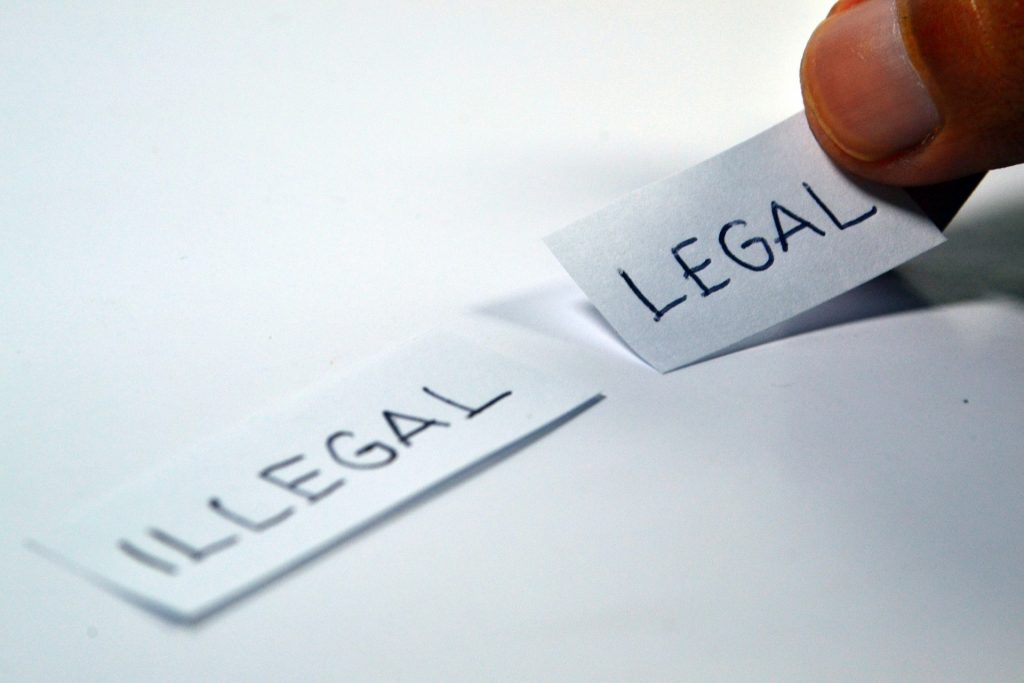What Is a Misdemeanor?

A misdemeanor charge’s definition could be confusing to many criminal defendants. For a start, the law doesn’t punish misdemeanants as harshly as it does with felons. However, unlike infraction violators, a misdemeanor will likely carry a jail sentence. Additionally, each state defines, classifies, and disciplines misdemeanors in its own and unique way. Similarly, what one state may consider to be a crime could be perfectly legal in another. So how should a misdemeanor suspect approach their case? Do they need a lawyer? What happens after their case is over and they fully serve their sentence?
Misdemeanors should certainly be taken seriously for several reasons. First of all, the consequences of a misdemeanor charge could ruin a criminal’s life before, during, and after their case. Secondly, due to the constantly changing state laws, some misdemeanors may get downgraded to infractions. This can affect many convicts’ lives. Thirdly, misdemeanants can utilize different methods that allow them to expunge a criminal sentence or minimize its impact.
In this article, we will outline all the noteworthy information that misdemeanants, suspects, and their families need to know. We cover the different classifications and definitions of misdemeanors across the country on both the state and federal levels. Just as importantly, this article lays out the critical differences between misdemeanors, felonies, and infractions, alongside other major trends and changes. Lastly, we address the consequences of a misdemeanor conviction and how convicts can effectively deal with their criminal record.

Multiple Crimes and Different Rules
The definition of a misdemeanor encompasses several types of offenses. Examples range from DUIs to minor thefts. Equally as important, each state applies the definition and classification of misdemeanors in its own way. Some jurisdictions categorize them alphabetically, starting with Class A for the most serious misdemeanors. Class B offenses are less serious than Class A, while Class C misdemeanors are not as severe as Class B. The alphabetical order ranks crimes based on how significant they are. Many states follow this system, including Texas, Oregon, Wisconsin, Utah, and Alaska. Other jurisdictions classify their misdemeanors numerically, such as Colorado, Arizona, and North Carolina. Class 1 misdemeanors have the harshest penalties and fines, whereas the less serious crimes are ordered numerically.
To further illustrate, here are a three examples. First, in California and Idaho, the legal system classifies all misdemeanors under a ‘general’ category. The crimes have the same maximum incarceration time (six months) and fine (no more than one thousand dollars). Second, West Virginia, doesn’t set any jail time or fine limits. Instead, judges make that decision based on each individual’s case. Third, Nebraska follows a very detailed and structured classification system. Its misdemeanors start with Class I. Offenses in this category could land suspects in jail for up to one year. They could also be required to pay as much as one thousand dollars in fines. Class II and III sentences carry less jail time and/or a lower maximum fine. Nebraska doesn’t require Classes IV, V, W misdemeanor offenders to spend any time in jail, but they may still have to pay fines.
Same Crime, Different Place and Definition
It is important to note that what may constitute a misdemeanor in one state is considered a felony in another. In the same vein, some states may not even treat certain offenses as crimes, even though others do. Because of this, misdemeanor convicts and defendants should carefully weigh the rules of where they were accused of a crime, rather than where they live. Cannabis possession, for instance, is approached differently from one state to another. Some states fully legalized marijuana usage, while others still treat it as a misdemeanor or felony offense. In fact, some state courts are even required to sentence offenders to a mandatory minimum (rather than maximum) amount of time in prison.
California’s legal system approaches the possession of other illegal substances as a misdemeanor offense. Marijuana usage, which is a felony on the federal level, is fully legal in the Golden State. Some jurisdictions’ laws may be somewhere in between. That is to say, they treat cannabis possession as a misdemeanor. For example, Utah recently downgraded drug possession from a felony to a misdemeanor. If Utah’s authorities arrested a Californian resident for marijuana possession, they will be charged with a misdemeanor. The fact that they purchased the drug in California, where it’s legal, is irrelevant under Utah’s (and other states’) laws.
Downgraded Offenses
Misdemeanants should keep up with changing policies, classifications, and definitions. Many courts and legislatures are downgrading offenses from felonies to misdemeanors and from misdemeanors to infractions. The most notable reclassified crime types are related to theft. Legislatures and courts are setting dollar limits that define when a theft case becomes a felony. In other words, the government will prosecute offenders that steal less than a certain amount of money (or its equivalent in property value) as a misdemeanor. Each state’s legal system establishes the local monetary amounts and limits.
Federal Misdemeanors and Definitions
If the federal government charges someone with a misdemeanor, the courts will follow standardized sentencing criteria across the board. Federal misdemeanants spend between five days and one full year in jail. In short, here is how the federal government classifies different types of misdemeanor offenses, alongside the jail time associated with each:
- Class A Misdemeanors: Six months to one year in jail
- Class B: Between thirty days and six months
- Class C: Between five and thirty days
Defendants should keep in mind that the federal government will prosecute them if they commit a state-level crime on federal property. At times, this applies to state offenses that aren’t categorized as crimes on the federal level. Moreover, the prosecution will treat the state-level violation as a federal misdemeanor (if it occurs on federal property). Equally as important, federal courts handle these cases. This means that they may follow a different process than a state or local court when it comes to where the records are kept, how the trial is conducted, and more.

Misdemeanors vs. Felonies vs. Infractions
In short, a misdemeanor offense’s definition, when it comes to seriousness and punishment, falls between an infraction and a felony. Infractions, unlike misdemeanors, aren’t crimes. They are low-level offenses that only carry a small fine, such as a speeding ticket or littering violation. Committing an infraction certainly doesn’t come with any jail or prison time. Federal infractions may carry a five day jail sentence, but no more than that. Misdemeanors, on the other hand, are considered a crime. Not only does the government prosecute them as such, but misdemeanants may have to spend time behind bars. However, this isn’t always the case. Misdemeanor violations also require offenders to pay fines, which are much heftier than infraction tickets or fees.
When compared to felons, misdemeanants serve their sentences in county jails rather than federal or state prisons. Moreover, their incarceration period doesn’t exceed one year. Severe felony offenders, on the other hand, could spend several decades, if not life, in prison. In addition, the fines that felons must pay could be in the hundreds of thousands of dollars. Misdemeanants don’t always get a financial punishment. When they do, it ranges from a few hundred dollars to several thousands. In fact, misdemeanor fines rarely exceed ten thousand dollars.
Misdemeanors: Punishments and Fines
Alaska and Wisconsin’s monetary penalties are amongst the highest in the country. Misdemeanants may pay up to a maximum of twenty-five thousand and ten thousand dollars in those two states, respectively. On the other end of the spectrum, violators in Michigan and Oklahoma can incur no more than five hundred dollars in fines. In fact, Michigan’s misdemeanants only spend a maximum of ninety days in jail (rather than an entire year). To put it another way, while misdemeanor offenders will spend no more than one year behind bars, there are also exceptions to this rule. California, Idaho, and North Carolina sentence misdemeanor violators to six months or less in jail. Vermont and Iowa, on the other hand, have a maximum misdemeanor jail sentence of two years. Colorado and Ohio’s limits are eighteen months.

The Consequences of a Misdemeanor
If a court ruled that a suspect is guilty of a misdemeanor, the decision would have consequential implications on the defendant’s life. Apart from a jail sentence and fines, misdemeanants may struggle to find a job or attain an educational scholarship. This is because misdemeanors are crimes of “moral turpitude.” To clarify, the offense would show up on any background check that a potential employer, school, lender, or landlord would conduct. Therefore, they could deny your application for work, educational enrollment, funding, or housing.
Above all else, this will be the case regardless of where you live or who charged you (i.e. federal or state officials). A misdemeanor conviction in Utah, for instance, would show up on your background check in California, to name an example. Nonetheless, as we will soon highlight, this isn’t always the case. It is also important to note that repeat misdemeanor violations could turn into a felony. This is especially common with DUI/OVI cases, amongst others. To clarify, defendants that incur several DUI charges in a certain number of years commit a felony. The number of DUIs and the timeframe depends on each state’s laws.
Having said all that, misdemeanants can utilize different ways to address their criminal record. Some of them require offenders to request an expungement, while other methods simply entail playing the waiting game.
Misdemeanors and Your Record
First of all, unlike felonies, county courts normally maintain and store misdemeanor records. Many employers, lenders, academic institutions, and landlords may not look at them. Instead, their background checks might only consider federal and state-wide records. This is especially common amongst large national entities and background check providers. In addition, misdemeanants may have better luck when they apply for a job or college in another county. This is because, even if the background check did include the county’s record, a misdemeanor wouldn’t show up in another location’s court system. The background check will not necessarily omit the misdemeanor, it just depends on the records that the employer/school/creditor looks at. Many of them will still search for information on all government levels and across the country. Federal and state-level misdemeanors may be stored with courts or government levels other than the county’s, as well.
Above all else, it is important for criminals to be honest when they fill out any type of application. For example, answering questions about your criminal record with complete honesty is better than lying and subsequently getting caught when the background check reveals other information. Not only will this cost you the potential job, scholarship, or loan, but misdemeanants may also face further disciplinary actions for lying about their criminal record.
The Waiting Game
A misdemeanor permanently remains on your record. The only way to remove it is via expungement, which we will discuss shortly. Nonetheless, in some states, misdemeanor convictions may become less harmful as time goes by. In Texas, for instance, background checks don’t look for misdemeanor records that are more than seven years old. In other words, if you’re applying for a job or a loan in Texas, your misdemeanor will not be an obstacle if the conviction took place more than seven years ago. The only exception to this rule are jobs that pay over seventy-five thousand dollars per year. Background checks for high-paying jobs in Texas will look at your entire criminal history, including old misdemeanors from decades ago.
Several other states also have similar time limits, such as California, Colorado, Nevada, New Mexico, New York, and Washington. These jurisdictions prohibit background check providers from showing criminal convictions – both felonies and misdemeanors – that occurred over seven years ago. Each of them also has exceptions to this rule based on income limits (which vary from one location to another). An additional (and crucial) factor to consider is how state laws count the seven years. In some jurisdictions, the timeline begins when the misdemeanant completes their jail sentence. Others will only start counting the seven years after the convict concludes any parole or probationary requirements, as well. Texas law, meanwhile, initiates the timeline during the trial.
Expungement
An expungement would permanently remove a misdemeanor from your record, regardless of how much time has passed. Expungements also remove criminal records on the federal, state, and county levels. However, successfully attaining one is certainly not easy. First, misdemeanants must wait until they finish their sentence and pay off any related fees. After an amount of time passes by (which varies from state to state), they may request an expungement. In order to be successful, misdemeanants must not repeat the same violation or engage in other types of crimes. Repeat offenders are usually ineligible for an expungement, especially if they commit several felonies. While misdemeanants can get their records expunged more easily than felons, multi-time offenders will still struggle.

Misdemeanor’s Definition: A Summary
In a few words, misdemeanors are relatively minor crimes in comparison to felonies. However, unlike infractions – which include speeding tickets and littering fines – the law treats misdemeanors as crimes. This means that a conviction will show up on your record and hinder your odds of getting approved for employment, funding, and/or housing. Every state has its own classifications and definitions of misdemeanors. Therefore, where you committed the crime is more important than were you reside. Moreover, the federal government will prosecute state-level misdemeanors if they take place on federal property.
State law doesn’t only define the scope and punishment of these crimes, but how a misdemeanors impacts your life after conviction. The only way to remove a misdemeanor from your record is via expungement, but some states minimize its impact after seven years pass. If you or a loved one committed a misdemeanor, your first step would be to check the prosecuting state’s laws. This will largely determine how you should approach your case, sentence, and life after release/conviction.
At the end of the day, what may constitute a crime in one place might be perfectly legal in another location. Defendants who understand this are more likely to have a successful case. Conversely, being unaware of these different rules and definitions could be the cause of the problem, to begin with.



